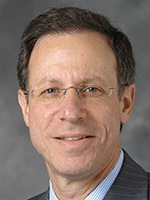June 2023—Consolidation in health care makes the news often. But the coming together of Kaiser Permanente and Geisinger Health and their launch of Risant Health got special attention. CAP TODAY publisher Bob McGonnagle asked Compass Group members for their take on the acquisition when they met online on May 2.
The Compass Group is an organization of not-for-profit IDN system laboratory leaders who collaborate to identify and share best practices and strategies.

Carbonneau
Kaiser Foundation Hospitals announced on April 26 it has acquired Geisinger Health. The CEO of Geisinger will be the head of Risant Health, a nonprofit organization that will be a second tier of the Kaiser integrated delivery and value-based care models. Eric Carbonneau, can you comment on this news?
Eric Carbonneau, MS, MLS(ASCP), chief operating officer, TriCore Reference Laboratories, Albuquerque: One of our sponsors, Presbyterian Healthcare Services, announced in March it is looking to do a joint venture with UnityPoint Health. I think we’re going to see a lot more of these.
Greg Sossaman, what do you make of it and do you think it puts the commercial laboratories a little behind the eight ball when we’re talking about entire systems merging and creating new entities?
Gregory Sossaman, MD, system chairman and service line leader, pathology and laboratory medicine, Ochsner Health, New Orleans: I think so. Futurists have spoken at the Executive War College meetings in the past, and a few years ago one of them referenced in his comments that there will be market consolidation and eventually we’ll see only a certain number of big hospital systems nationwide. It was interesting to hear that reiterated at the Executive War College this year and then a few hours later see the announcement about Geisinger and Kaiser Permanente. This kind of activity is in response to some of what’s going on with Optum and the consolidation of physician practices and other expense-reduction efforts in large hospital systems. But this activity does protect our business. Having the work from those physicians stay within a system or systems helps us. It’s not being syphoned out.
Richard Zarbo, what are your thoughts?
Richard J. Zarbo, MD, system chairman, pathology and laboratory medicine, Henry Ford Health, Detroit: I don’t have a direct line of sight on national mergers like this. I just hope it isn’t an ill-founded lemmings following lemmings across the United States for the next five years before we find out whether there are economies of scale or whether they can make money in a value-based reimbursement environment.
One of the clear winners in any of this consolidation seems to be Medicare Advantage. It was considered increasingly to be the big winner and compelling people to consolidate. Do you feel that pressure of Medicare Advantage in the Henry Ford system?
Dr. Zarbo (Henry Ford): Yes, and we’re successful at it because we have a regional system and people buy local. All medical care is local and all quality is local. That’s why I don’t understand the national play. Most people live within 10 miles of where they were born, so it’s not as if we’re traveling across the U.S. for health care purposes.

Dr. Zarbo
Once a concept like consolidation is in the water, it usually takes a decade or more to work through the concept.
Dr. Zarbo (Henry Ford): Most mergers fail. There are issues with scale. If you get too large, you lose your opportunity for efficiency. These are the negatives I see when you try to become big like this. It doesn’t worry me. I just hope it isn’t going to be the next CEO quest, where they follow each other along on the same path.
 CAP TODAY Pathology/Laboratory Medicine/Laboratory Management
CAP TODAY Pathology/Laboratory Medicine/Laboratory Management
